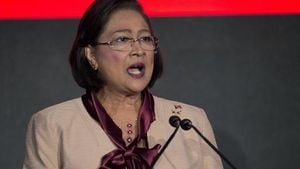Indonesia has made headlines recently as it strives to play catch-up on the international stage, particularly concerning economic partnerships and investments. A glaring example of this is the recent announcement from Nvidia, the American tech giant, which chose to establish its new artificial intelligence (AI) research center and data facility in Vietnam rather than Indonesia. This move poses serious questions about Indonesia's investment climate and competitive position within Southeast Asia.
Nvidia's CEO Jensen Huang announced the opening of the center during his visit to Vietnam, which is set to focus on AI software development. The goal is to leverage Vietnam’s strong base of skilled STEM graduates and synergize with local initiatives involving the government, universities, and industries. “We are very pleased to open the Nvidia research and development center to accelerate Vietnam’s AI integration,” Huang commented. This strategic choice highlights Vietnam's growing reputation as a tech investment hub—a title Indonesia has struggled to maintain amid its obstacles.
According to Teuku Riefky, an economist at the University of Indonesia’s Institute for Economic and Social Research (LPEM UI), Indonesia is swiftly falling behind its neighbor. Riefky attributes this lag to several barriers affecting foreign direct investment (FDI), particularly surrounding the tech sector. He pointed to inefficiencies and the cumbersome administrative processes required to establish businesses. "To start any operations, Indonesia obliges investors to gather 11 documents, whereas Vietnam only requires eight. It gets worse with taxation where Indonesia’s investors face 26 tax documents compared to just six for those operating out of Vietnam," Riefky articulated at the Selular Business Forum held on December 5, 2024.
This prolonged bureaucratic process not only slows down investment but also discourages it altogether. Riefky noted another alarming trend: the declining quality of Indonesian human resources. Over the years, Indonesian professionals, who were once considered superior to their counterparts from Vietnam, are reportedly falling behind. If addressed soon, these issues could prevent Indonesia from seizing the technology sector’s vast opportunities. The economist expressed concerns, stating, “If major reforms are not picked up now, Indonesia will be left behind, much like we see with Nvidia choosing Vietnam. It’s all about attractiveness, and it appears other nations are doing far more to bolster their positions.”
The situation presents stark contrasts with the results of the recent Indonesia-Europe Investment Summit, signaling Indonesia's intent to reposition itself as a prime partner for foreign investment. Rosan Perkasa Roeslani, Minister of Investment, reaffirmed the country’s substantial market potential at the summit held on November 10, 2024. He stressed the importance of collaborating with European businesses, emphasizing, “With Europe’s expertise, technology, and resources paired with Indonesia's dynamic environment, mutual growth opportunities are plentiful.”
This meeting, attended by the EU Ambassador to Indonesia, Denis Chaibi, hinged on fostering Indo-European relations. Ambassador Chaibi underscored the importance of unwavering trade partnerships, stating, “Together, we can create transformative investments for both parties and bolster our commitments toward sustainability.”
Investment data from the past five years paints an insightful picture. Despite the challenges, European nations have become significant contributors to Indonesia’s FDI, representing the fifth-largest investment origin overall. Notably, the Netherlands, France, and Germany stand out as the top contributors from Europe. Despite these positive trends, Roeslani acknowledged the necessity for Indonesia to simplify its processes to attract more tech investors.
At the intersection of these developments lies the issue of live cattle imports—a key focus for Indonesia’s agricultural and food security strategies. Recently, high-ranking officials hinted at the imminent opening of the market to Brazilian live cattle imports. Agung Suganda, the Director General of Animal Husbandry and Animal Health at the Ministry of Agriculture, asserted the potential signing of new regulations could allow Brazil access to Indonesia’s lucrative cattle market.
Traditionally reliant on Australia for feeder cattle, Indonesia's burgeoning demand for dairy cattle paves the way for diversification. Recently, Indonesia and Brazil signed memoranda of understandings aimed at bolstering bilateral trade, spotlighting the need for rigorous health standards to safeguard against livestock diseases.
The importation of cattle from Brazil proves complex, particularly concerning concerns over foot-and-mouth disease. Suganda reiterated stringent measures would be implemented to confirm livestock arriving would be sourced from disease-free regions, thereby mollifying public concerns about potential health risks.
Despite recent setbacks and hurdles, Indonesia's drive for improvement cannot be overlooked. While foreign investment ceases to flow as undeniably as neighboring countries like Vietnam, initiatives like the Indonesia-Europe Investment Summit and the potential changes to agricultural import laws suggest the country is strategizing for positive change.
Supporters of the reform processes insist on the urgent need for bureaucracy overhaul to render it more business-friendly. Improving human capital quality and refining legal protections for investors is equally important, especially as Southeast Asia grows as an economic powerhouse.
Indonesia’s market has potential waiting to be unlocked, yet for investors empty-handed till now, clarity and speed are the keys to re-engagement. Without decisive measures to address impending structural roadblocks, the reality remains clear: Indonesia risks relegation to the sidelines as competitor nations power forward with holistic plans and clarity.



